The Green Knight: Off With His Head, by Dave Platt

“Tell me a tale of thyself, so that I may know thee.”
“I have none to tell.”
“Yet.”
This exchange, early on in David Lowery’s stunning new film, The Green Knight, between King Arthur, his nephew Gawain, and Queen Guinevere (in that order), elegantly encapsulates this intoxicating story of destiny and honour. Amidst the revels of all who attend the Christmas party at which this exchange takes place, the king looks to his sombre nephew. “I turn to thee,” he says, “and I see want.” There is an emptiness in the hedonism and cavalier attitude of Dev Patel’s Gawain. He is a rash young man who doesn’t appear to take anything too seriously, who spends his days drinking and joking with a wry grin. But beneath that front is a desire to be something more, an aspiration to the greatness of chivalry. When the Green Knight, a towering figure who seems to be an avatar of nature itself, arrives at the court of King Arthur moments later, the young man senses his time has come.
The set-up is simple. The Green Knight suggests a Christmas game. He will allow one of those present to step up and deal him a blow with his sword. The condition is that one year later that man must journey north to meet the Green Knight in his chapel, where the blow will be returned in kind. When no one volunteers, sensing some cruel twist to the jape, Gawain impulsively steps up and, with a single blow, decapitates the Knight. But then the Green Knight lifts his head off the ground, and rides out holding it under his arm, laughing as he goes. A year passes all too quickly and Gawain finds himself bound through his own reckless actions to a journey that, though it brings him renown even before he sets off, he fears can only end with his death.
Dev Patel’s plays Sir Gawain as a bit of a cad, a selfish and fearful young man. But this attitude toward the world is born from the naivety of a young man lost in the world, desperate to find meaning and purpose. Patel is finally given a role in which he can display his enormous onscreen charisma, and the characterization of Gawain as a less than honourable knight-in-waiting is a captivating choice from him and Lowery. Despite his roguish persona (or perhaps because of it), it is fascinating to watch a character who is only too aware that he is not ready, either for the trials of his journey or the death that supposedly awaits him at its end, to go on an odyssey that he believes will earn him glory. Lowery has adapted the classic tale (in which Sir Gawain starts off already being a great hero) into a mythical coming-of-age tale that defies most every expectation that comes with that label. For Gawain, real life seems so much less real than his ideal of who he wants to be seen and remembered as. Early on, he is asked by his lover, a low-born consort named Essel (Alicia Vikander), “Why greatness? Why is goodness not enough?” It is an unanswered question that dogs him across the rest of the movie’s length. We sense that he is waiting for something external to turn him into this great knight, rather than anything to do with his own growth.
From the movie’s opening image, it feels suffused with dark magic and with the atmosphere of something ritual, not to mention mythic. History, parable and myth are mingled together in the hypnotic imagery and soundscape in a way that manages to feel epic in scale and yet somehow entirely contemporary in its characters and dynamics. There is an mesmerizing quality to the insanely gorgeous cinematography, with its play of light, shadow and silhouette and its lush, green-tinged complexion. It’s so easy to give oneself over to the strange otherworldliness, especially as so much of the storytelling takes place non-verbally on the level of the equally rich costume and production design. The soundtrack, all strings, whispers and hymn-like voice, is a big part of this quality, too. There are many moments in which it becomes difficult to tell if what we are watching is intended to be reality or a vision in the mind of Gawain. In fact, I would suggest that the people who will love this film as much as I did are specifically those able to surrender to its patient dream-logic. It is a much less conventional work than it might seem from the trailers, so anyone looking for a straightforward Arthurian adventure might find themselves frustrated (I hope that marketing encourages those less inclined to the unconventional to see it). “The world is fit for all manner of mysteries,” says Joel Edgerton’s mysterious lord at one point. Lowery is definitely a filmmaker far more interested in the texture and affective dimensions of those mysteries than their resolution.
This is a movie about the old and new, death and rebirth, the binary of society’s culture and the natural world it pushes against. Although Christmas and Christian imagery loom large, the film is set in a Britain that still straddles the old, pagan traditions and the new religion of a more modern world. As Gawain rides out on his journey, the soundtrack is alive with voices speaking warring Anglo-Saxon words and Latin ones over one another. Green is ever-present as the colour of magic, and of nature, the colour that no matter how chivalrous or virtuous a knight may be, will eventually cover his footsteps, his tomb, and all trace of his earthly deeds. The Green Knight’s terrifying presence is drawn from this quality of inevitability, and this tension between nature and chivalry is one of the movie’s most fascinating elements. Another is the theme of temptation. Along his journey Gawain, though he is no knight, is given many the test of one – tests of his empathy, his courage, his virtue. Most evocatively, Alicia Vikander plays both his commoner love back home and the beautiful lady of a magnificent estate belonging to a mysterious lord played by Joel Edgerton, who attempts more than once to seduce him into her bed. Whether with her or the other characters he meets along the way, many times in the film Gawain must ask himself, what is the knightly thing to do? The movie seems less interested in whether he chooses right or wrong than in the reasons for his choices as aspects of masculinity and an obsession with what it means to be a hero. Where he shows strength and where weakness is often unpredictable.
Along with the magnetic Patel and Vikander in her double role, the cast is uniformly excellent. Barry Keoghan is a standout as an unsettling scavenger who helps Gawain out and feels entitled to a reward, as is Ralph Ineson as the intimidating title character who feels entirely ancient and terrible as a tester of mortals. Without much screen time his presence dominates the movie; it is entirely understandable why Gawain should feel that his journey can only end with his doom at the hands of nature’s personification. Sean Harris is typically superb as King Arthur, who is by now a weary old man who feels a great deal of sympathy for his young nephew. Sarita Choudhury is also excellent as Morgan Le Fay, the witch who is sister to the king and mother to the protagonist, and plays her as alternately ominous and maternal. The specifics of her role in the summoning of the Green Knight is one of the movie’s many intrigues to ponder.
This is an unlikely and unconventional film that represents a career-high for David Lowery. For anyone that goes into this a fan of his previous work, I doubt you will be disappointed by this enchanting tale. It is a movie bathed in magic and mystery, and rendered with stunning visual flair. If you can be patient and open to ambiguity, and let yourself be swallowed up by this quite singular myth, this will be a film you’ll no doubt be coming back to many times. One viewing of this haunting hero’s journey was certainly not enough for me.




























